Melodi
Disaster Cat
I am posting this because it is a beautiful example of how to do things RIGHT! This is what Sweden mostly got WRONG, and I am hoping Ireland can learn from their mistakes. As someone with a degree in Anthropology, I can say that if you send relatively small groups of people out and scatter them in small towns and villages, provided they are appropriately supported. Hence, they are not a drain on the local economy. Usually, the reception is friendly. I've included photos because they are breathtakingly beautiful and show why people fleeing war want to live there. Also, why, if jobs can be found, do they want to stay there until it is safe to come home, or they may stay and become part of their new country and not part of the problem? - Melodi
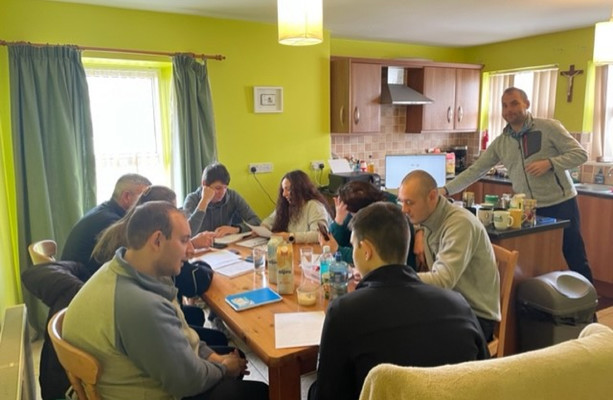
 www.thejournal.ie
'When I saw the ferry I thought - ohhh': The Ukrainians who have made Tory Island home
www.thejournal.ie
'When I saw the ferry I thought - ohhh': The Ukrainians who have made Tory Island home
“When we read about Tory Island and that it only has around 130 people, we thought, ‘wow, this will be interesting’.”
“WHEN THE WAR broke out last year, I remember seeing people fleeing the country with their animals. I’m a big animal lover and I wouldn’t want to leave anywhere without my pets.”
Deirdre Sweeney is sat in the kitchen of the parochial house in Tory Island, where an hour earlier a group of ten Ukrainians were learning English.
Tory Island, off the north-west coast of Co Donegal, is Ireland’s most remote inhabited island.
It is only accessible via a daily ferry or a twice-weekly helicopter round trip.
 DIARMUID PEPPER / THE JOURNAL The helicopter to Tory Island.
DIARMUID PEPPER / THE JOURNAL The helicopter to Tory Island.
Deirdre is the owner of an eye-catching green building which was once a hostel but now houses 13 people who fled Ukraine after the war broke out.
“We applied to take people in and we got an answer really quickly. And within a couple of weeks, there were a couple of families who landed with their cats and their dogs and everything else.”
Not everyone who pledged accommodation was accepting pets, which Deirde says is a foreign concept to her.
“I couldn’t understand them at all,” she said. “Why would you not accept pets, what’s wrong with you?
“When I found out we were accepted, I joined this group online to see what would really make a difference when they arrive. The first group that arrived had three cats and a dog between them.
“So when they arrived in their rooms, there were dressing gowns and slippers and wee teddys on all the beds, and wee pet beds too.
“All I knew was that there was a dog coming and I had gone out and bought a pet blanket, but then they came off the boat with a Husky and I thought, ‘Jesus, this blanket isn’t going to anywhere near this boy!’”
Anastasiya is one of the 13 Ukrainians now living on Tory Island and I speak to her from the living room of the parochial house while the others are learning English in the kitchen.
Across four hours throughout the week, the Ukrainian arrivals learn English with their teacher Aidan McGinley.
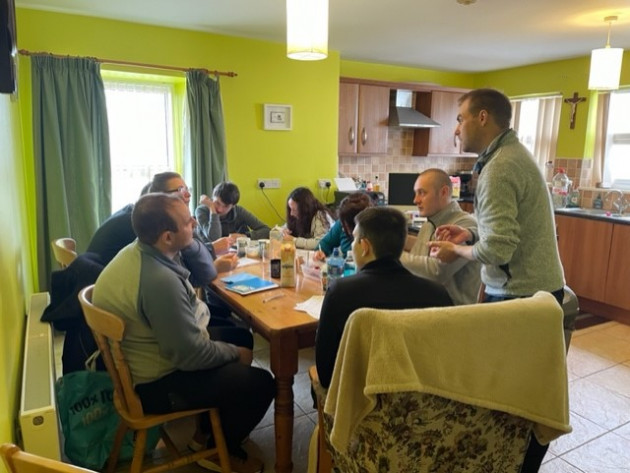 DIARMUID PEPPER / THE JOURNAL Aidan McGinley during an English lesson on the island.
DIARMUID PEPPER / THE JOURNAL Aidan McGinley during an English lesson on the island.
“We learn to read and speak, and discuss many topics and drink coffee,” says Anastasiya.
Anastasiya came with her partner to Tory Island and they are the latest additions to the community.
They didn’t know anyone else who was already staying there.
She tells me that Deirdre’s decision to allow pets is probably one of the factors that led to her being housed on the remote island.
“When we came to the CityWest Hotel, we slept there one night and in the morning, the people working there told us they had found a home for us and we came here to Tory Island,” explains Anastasiya.
“We googled Tory Island when we were in the taxi coming here. But we were fleeing the war and we didn’t give too much concern about where we would be sent. It doesn’t matter where we stay.
“But when we read about it and that it only has around 130 people, we thought, ‘wow, this will be interesting’.”
The island’s population is now around 150, after the arrival of the Ukrainians.
Anastasiya wasn’t aware that a ferry or helicopter would be needed to access the island, and said the weather was very bad on her arrival.
“We arrived at around 5pm and we were very tired. I was upset because my dog was still in Dublin in quarantine and I was thinking about her the whole time.
“But the next day, the weather was good and we went for a walk. The island is beautiful.”
Anastasiya’s dog arrived on the island shortly after: “She is like my child. I can’t leave her.”
It’s a long way from the life she once knew: “I want to go back home, but I don’t have a choice and now we live here.
“Sometimes it’s strange because Ireland is so quiet. In Ukraine, I lived in a big city of over 500,000 people and it was very noisy.”
 DIARMUID PEPPER / THE JOURNAL
DIARMUID PEPPER / THE JOURNAL
Anastasiya still has family in Ukraine, some of whom are in areas which are occupied by Russia. She speaks to them every day but says it is hard to discern how they are feeling.
“Meals are very expensive in occupied territories and people need to always think about what they say in these areas,” she explains.
Anastasiya decided to flee to Ireland on the advice of friends who had already made the journey here.
“They said the people here were very good and kind and friendly. They encouraged us to come.”
She added that her level of English was also a factor in coming to Ireland.
The route to Ireland required a bus to an airport, a flight to the Netherlands, and then a further flight to Dublin.
But Anastasiya has quickly become well-versed in the Irish issues of the day.
“Many people came to Ireland from Ukraine and before I came, I read that in Ireland there is always a problem with accommodation. Now it’s very hard I think.”
Later, she added that Ukrainians she is in contact with who live on the mainland have warned her that a lack of public transport is a big barrier to gaining employment. [everyone has that problem, so it is something, everyone in rural areas understands-Melodi]
She said that the people she speaks
ks to feel that a car is essential to get a job, but this is a luxury few have. [It is, not transportation is a major reason people out here end up on welfare - there simply is no employment and no place to live in the cities - Melodi]
While Anastasiya had a high ranking job in Ukraine, she felt that her grasp of English would be a barrier to getting a job here.
In any case, getting work on Tory Island would be nigh impossible.
“We like Tory Island because people are very kind and we know everyone,” said Anastasiya. “The only problem is the lack of work.”
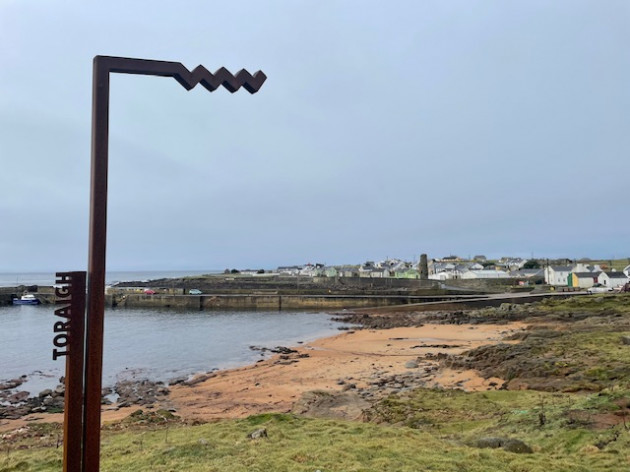 DIARMUID PEPPER / THE JOURNAL The Wild Atlantic Way sign on Tory Island.
DIARMUID PEPPER / THE JOURNAL The Wild Atlantic Way sign on Tory Island.
I inquired if she could foresee a future where she decides to remain in Ireland: “I don’t know because the situation is very changeable. I want to go home because our country is very beautiful too.”
Earlier this month, she and the other Ukrainians on Tory Island where learning how to make St Brigid’s crosses.
“When we take part in these things, we enjoy it a lot,” she said. “It is always interesting to learn about other people’s cultures.”
Tory Island is in a Gaeltacht area, and while Anastasiya has an appreciation for the language, she is finding is quite difficult: “I think the Irish language is beautiful but the pronunciation is very hard.”
I ask her what method of transport she prefers to use when travelling to the mainland. She says that in the winter, they use the helicopter but that at other times they typically use the ferry.
I myself had used the helicopter that morning. It was my first time in a helicopter and the visibility was poor.
I asked her if she ever finds the helicopter ride to be scary: “Oh no! I think now few things can scare Ukrainians, and certainly not a helicopter ride.”
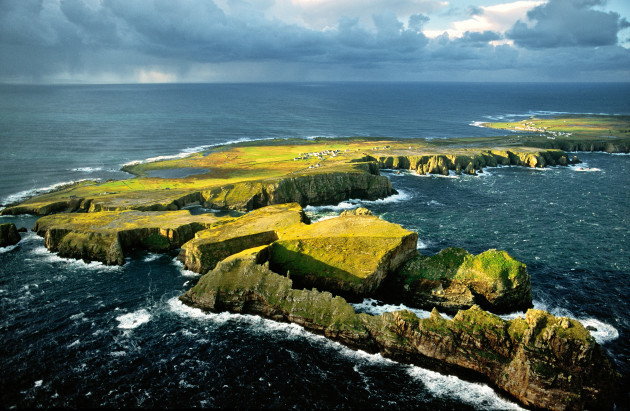 ALAMY STOCK PHOTO Tory Island as seen from above.
ALAMY STOCK PHOTO Tory Island as seen from above.
Once I had finished interviewing her, I asked if we had missed anything out.
She said she had a message and used Google Translate to help gather her thoughts.
“We are very grateful to the family who took us in. They are wonderful people and always ready to help and are friendly and cheerful.
“In general, everyone in the island is kind and always smiling and we are very glad we have gotten to know them, even though it is under such unpleasant circumstances.”
She later shows me her phone, which has a further message that is delivered with slight aid from Google Translate: “I would also like to add that all Ukrainians are very grateful for the help from such a small, but big-hearted country.”
If Anastasiya were to be given a choice to remain on Tory Island or live in a city like Dublin, she said she would choose to remain on the island.
“That’s good to hear,” says Deirdre upon being informed of this.
“I have to say, they’re the nicest people I’ve ever come across. They’re so grateful and they really have blended in.
“During the summer months they were all fishing, and then they’re great bakers and they’re forever sending cakes up to Mom and Dad, and they’ll help Dad if he is doing anything.
“They really want to help, they don’t want to be a burden on anybody, they really want to get stuck in.”
Deirdre added that Tory Island also has a lot to offer: “We can provide so much more than a lot of other rural places because this is like a little village.
“We have the health centre, the shop, schools, church, hotel, gym, pub. Everything is just within walking distance, and yes you can be cut off at times, but I think it weighs out you know, it’s pretty 50/50.
“We all hope they will get to return home soon but until then they are making Tory Island their home.”
Another benefit available to the Ukrainians is the services of Aidan McGinley, who teaches Geography in the local school as well as teaching English to the Ukrainians.
It’s quite a stroke of good fortune th
at he is on the island.
“It is very difficult for a teacher from the mainland to come here to teach English because of the rough sea,” explains Aidan.
“It’s better if somebody is living on the island so that you can work every day. If somebody is on the mainland, they won’t be able to work every day.”
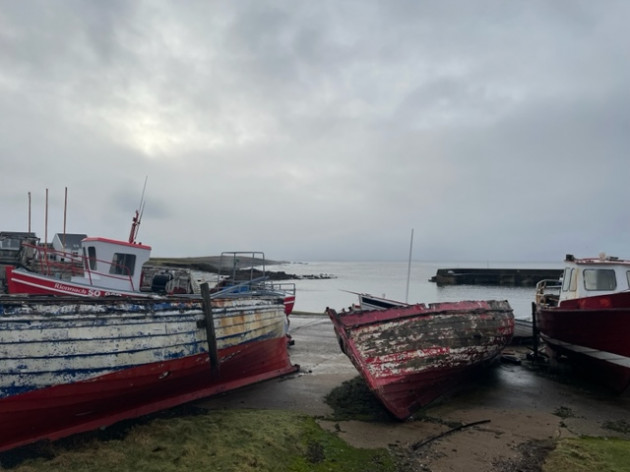 DIARMUID PEPPER / THE JOURNAL View of the sea from the harbour.
DIARMUID PEPPER / THE JOURNAL View of the sea from the harbour.
The ferry was cancelled for several days due to high waves after my visit, which underscores Aidan’s point.
While it may seem strange to think of Ukrainians living on Tory Island, Aidan says the island has a long history of welcoming new people.
“My own wife is here from El Salvador, and we also have people from France, Mauritius, the UK, so for these people it’s natural to be here.
“It’s a big surprise for people from the mainland, especially people really close by in the mainland, because they’ve never been to Tory themselves and they can’t imagine going out Tory.
“But the more information you have, the less surprising it becomes; it’s only surprising if you don’t know what Tory is like.”
Teaching English to displaced people is also not an unusual thing for Aidan.
“I worked in Iraq during the war there,” he reveals.
]
Housing constraints ‘causing serious risk’ for islanders trying to sustain populations
“It was in a Kurdish region, halfway between Mosul and Kirkuk. We set up a school and taught children who were fleeing the conflict from Baghdad.
“They were Sunni and Shia, lots of different groups of people from Iraq in the classroom at the time.
“So I was always aware of how a situation in one place would affect a different place. I’m only surprised that we haven’t been as affected before, that we haven’t seen the same numbers resettled from Syria, or Afghanistan or from other places.
“It seems to be that we’ve all increased our awareness of situations elsewhere recently.”
Aiden sees the Ukrainian arrivals more than most and said they have adapted very well to island life.
For example, he tells me that one of the 13, a young man named Bogdan, is a “fabulous exercise instructor”.
“He doesn’t put any pressure on people to lift more than they are able to, he’s very good at explaining.”
One of the men, affectionately known as ‘Papa’, also recently helped to restore the roof of the church.
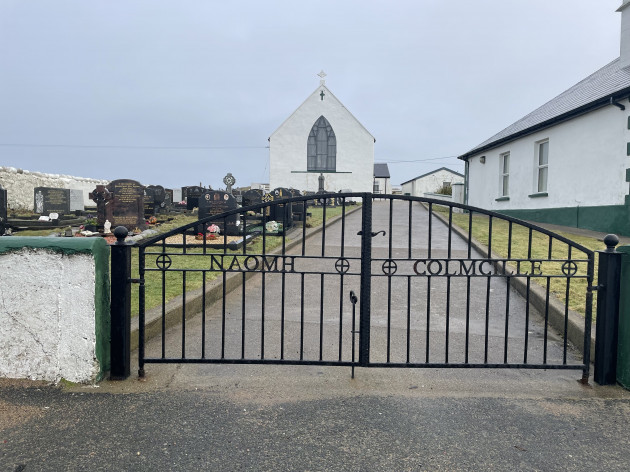 DIARMUID PEPPER / THE JOURNAL The church with the recently restored roof, and the parochial house to the right.
DIARMUID PEPPER / THE JOURNAL The church with the recently restored roof, and the parochial house to the right.
Aiden adds that they “share their abilities and pastimes to break down barriers and break down the language barrier”.
“People are often surprised at how similar we are. Even though we come from different places, the human connection comes through in the laughter and sharing experiences.
“Whether it’s making a St Brigid’s cross or whatever, it doesn’t really matter what the activity is; as long as people are sharing things together, people enjoy that. Both communities benefit from this.”
Aidan said it will “realistically” take three years for most of the Ukrainian inhabitants on the island to learn English to a degree that would enable them “to cope with a working environment”.
When it comes to work on the island, the local schools are the biggest employers, but some years there are not enough children to allow for a pre-school.
Anastasiya was aware of the accommodation crisis in Ireland and Tory Island is not immune to the problem.
The parochial house is now Aidan’s home, a situation he says suits both parties.
“There is no full-time priest here on the island. The priests would come in from the mainland once a week on the boat or in the helicopter, say mass, and then return.
“They were very, very good to rent this place to us and we’re very lucky to be here. It’s good for the school to have somebody who’s going to be here every day, and then parish get paid the rent as well, so it keeps the place going rather than the building being empty. I think it’s good for a building to be used.”
Not many of the buildings on Tory Island are being used.
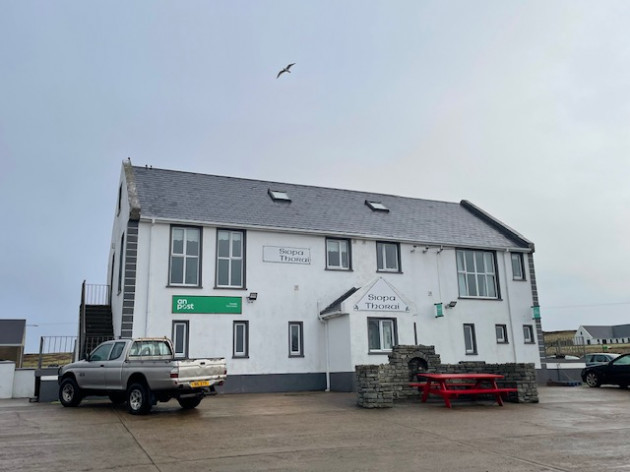 DIARMUID PEPPER / THE JOURNAL 'It's a great relief when a baby is born,' says Aidan, 'because that's employment for teachers for years after that, it's a new customer for the shop.'
DIARMUID PEPPER / THE JOURNAL 'It's a great relief when a baby is born,' says Aidan, 'because that's employment for teachers for years after that, it's a new customer for the shop.'
“There is an accommodation problem here, the same as there is on the mainland,” said Aidan.
“Accommodation wasn’t being made available to people like me renting, because as soon as the summer time would come, tourists were paying more money than the local people.
“Yes, we’d be given accommodation for the wintertime, but then we’d need to pack up and move in a panic and try and find somewhere for the summer time.”
For Aidan, the problem is a lack of supply, particularly on an island where a new home hasn’t been developed since he was a child.
“I’m renting, but even if all of the Ukrainians go home tomorrow, I’ll still be renting and I’ll still be having the same problem. I won’t be competing against people making the houses available for Ukrainians, I’ll be competing against tourists visiting the Wild Atlantic Way.
“So it’s not really solving the problem to have fewer people here. It’s only going to solve the problem when the vacant houses are made available to people renting or wishing to buy and when more houses are built, and it’s been a long, long time since a public house has been built on Tory Island.” [Again, everyone on the Island has the problem of being priced out of their own village by tourism so the refugees are not a threat. They may even eventually help solve the problem by drawing national attention to it - Melodi]
“In theory, if there’s peace in Ukraine and they go home in ten years’ time, we’ll still have the same problem because there’s lots of vacant houses. You’ll see that when you’re walking around, more than half of the houses are empty.”
On my walk from the helicopter pad to the parochial house, it seemed clear that this was the case.
“There’s a fundamental problem with lack of supply, not really with what the supply is used for. The existing supply, if it’s used for Airbnb or if it’s used for refugees, that doesn’t make any difference. It’s how much supply there is that makes the difference.
“There should be accommodation for all; there should be a tourist market, there should be accommodation for Ukrainians, there should be accommodation for me as well. Not one instead of the other, because that doesn’t help in the long run.”
Planning blockages, high building costs and no rental options are creating a housing crisis on many of our offshore islands, with Noteworthy reporting problems similar to that on Tory Island as part of its series on island depopulation.
Tory Island is very proud of its Irish language heritage and the local schools are taught through the medium of the Irish language.
However, Aidan is confident that if the Ukrainians stay on the island for a considerable length of time, they’ll also begin to speak Irish very well.
He’s also keenly aware that there is a sense in which the island needs the Ukrainians as much as they need a place of refuge.
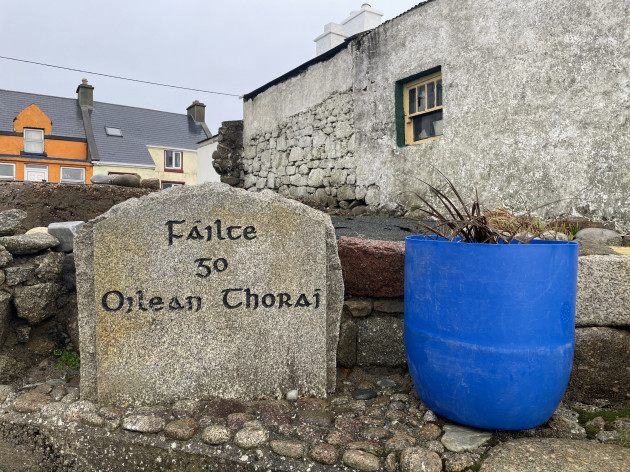 DIARMUID PEPPER / THE JOURNAL A 'Welcome to Tory Island' / Failte go Oilean Thoraí' engraving.
DIARMUID PEPPER / THE JOURNAL A 'Welcome to Tory Island' / Failte go Oilean Thoraí' engraving.
“The island community needs people. If an island community drops below 100, then it’s really difficult to justify having a secondary school, having a helicopter service in the wintertime, having a health centre because it needs a nurse, keeping a shop opened.
“Then it would become really difficult to sustain living on the island. So the biggest motivation for people is to make sure that the island community is sustainable. So it’s a great relief when a baby is born, because that’s employment for teachers for years after that.
“It’s a new customer for the shop and a passenger for the boat. Although the heritage here is worthwhile, even if there’s only one person on the island, it’s difficult to explain that to people in charge of budgets.
“So the bigger the population, the more people that are here, it makes life easier and it’s important for the survival of the community.”

'When I saw the ferry I thought - ohhh': The Ukrainians who have made Tory Island home
“When we read about Tory Island and that it only has around 130 people, we thought, ‘wow, this will be interesting’.”
“When we read about Tory Island and that it only has around 130 people, we thought, ‘wow, this will be interesting’.”
“WHEN THE WAR broke out last year, I remember seeing people fleeing the country with their animals. I’m a big animal lover and I wouldn’t want to leave anywhere without my pets.”
Deirdre Sweeney is sat in the kitchen of the parochial house in Tory Island, where an hour earlier a group of ten Ukrainians were learning English.
Tory Island, off the north-west coast of Co Donegal, is Ireland’s most remote inhabited island.
It is only accessible via a daily ferry or a twice-weekly helicopter round trip.

Deirdre is the owner of an eye-catching green building which was once a hostel but now houses 13 people who fled Ukraine after the war broke out.
“We applied to take people in and we got an answer really quickly. And within a couple of weeks, there were a couple of families who landed with their cats and their dogs and everything else.”
Not everyone who pledged accommodation was accepting pets, which Deirde says is a foreign concept to her.
“I couldn’t understand them at all,” she said. “Why would you not accept pets, what’s wrong with you?
“When I found out we were accepted, I joined this group online to see what would really make a difference when they arrive. The first group that arrived had three cats and a dog between them.
“So when they arrived in their rooms, there were dressing gowns and slippers and wee teddys on all the beds, and wee pet beds too.
“All I knew was that there was a dog coming and I had gone out and bought a pet blanket, but then they came off the boat with a Husky and I thought, ‘Jesus, this blanket isn’t going to anywhere near this boy!’”
Anastasiya is one of the 13 Ukrainians now living on Tory Island and I speak to her from the living room of the parochial house while the others are learning English in the kitchen.
Across four hours throughout the week, the Ukrainian arrivals learn English with their teacher Aidan McGinley.

“We learn to read and speak, and discuss many topics and drink coffee,” says Anastasiya.
Anastasiya came with her partner to Tory Island and they are the latest additions to the community.
They didn’t know anyone else who was already staying there.
She tells me that Deirdre’s decision to allow pets is probably one of the factors that led to her being housed on the remote island.
“When we came to the CityWest Hotel, we slept there one night and in the morning, the people working there told us they had found a home for us and we came here to Tory Island,” explains Anastasiya.
“We googled Tory Island when we were in the taxi coming here. But we were fleeing the war and we didn’t give too much concern about where we would be sent. It doesn’t matter where we stay.
“But when we read about it and that it only has around 130 people, we thought, ‘wow, this will be interesting’.”
The island’s population is now around 150, after the arrival of the Ukrainians.
Anastasiya wasn’t aware that a ferry or helicopter would be needed to access the island, and said the weather was very bad on her arrival.
- If you want to find more about Ireland’s offshore islands, read Noteworthy’s recent ISLAND NATION investigation which revealed that islanders have been waiting 25 years for policies to thrive and not just survive.
“We arrived at around 5pm and we were very tired. I was upset because my dog was still in Dublin in quarantine and I was thinking about her the whole time.
“But the next day, the weather was good and we went for a walk. The island is beautiful.”
Anastasiya’s dog arrived on the island shortly after: “She is like my child. I can’t leave her.”
It’s a long way from the life she once knew: “I want to go back home, but I don’t have a choice and now we live here.
“Sometimes it’s strange because Ireland is so quiet. In Ukraine, I lived in a big city of over 500,000 people and it was very noisy.”

Anastasiya still has family in Ukraine, some of whom are in areas which are occupied by Russia. She speaks to them every day but says it is hard to discern how they are feeling.
“Meals are very expensive in occupied territories and people need to always think about what they say in these areas,” she explains.
Anastasiya decided to flee to Ireland on the advice of friends who had already made the journey here.
“They said the people here were very good and kind and friendly. They encouraged us to come.”
She added that her level of English was also a factor in coming to Ireland.
The route to Ireland required a bus to an airport, a flight to the Netherlands, and then a further flight to Dublin.
But Anastasiya has quickly become well-versed in the Irish issues of the day.
“Many people came to Ireland from Ukraine and before I came, I read that in Ireland there is always a problem with accommodation. Now it’s very hard I think.”
Later, she added that Ukrainians she is in contact with who live on the mainland have warned her that a lack of public transport is a big barrier to gaining employment. [everyone has that problem, so it is something, everyone in rural areas understands-Melodi]
She said that the people she speaks
ks to feel that a car is essential to get a job, but this is a luxury few have. [It is, not transportation is a major reason people out here end up on welfare - there simply is no employment and no place to live in the cities - Melodi]
While Anastasiya had a high ranking job in Ukraine, she felt that her grasp of English would be a barrier to getting a job here.
In any case, getting work on Tory Island would be nigh impossible.
“We like Tory Island because people are very kind and we know everyone,” said Anastasiya. “The only problem is the lack of work.”

I inquired if she could foresee a future where she decides to remain in Ireland: “I don’t know because the situation is very changeable. I want to go home because our country is very beautiful too.”
Earlier this month, she and the other Ukrainians on Tory Island where learning how to make St Brigid’s crosses.
“When we take part in these things, we enjoy it a lot,” she said. “It is always interesting to learn about other people’s cultures.”
Tory Island is in a Gaeltacht area, and while Anastasiya has an appreciation for the language, she is finding is quite difficult: “I think the Irish language is beautiful but the pronunciation is very hard.”
I ask her what method of transport she prefers to use when travelling to the mainland. She says that in the winter, they use the helicopter but that at other times they typically use the ferry.
I myself had used the helicopter that morning. It was my first time in a helicopter and the visibility was poor.
I asked her if she ever finds the helicopter ride to be scary: “Oh no! I think now few things can scare Ukrainians, and certainly not a helicopter ride.”

Once I had finished interviewing her, I asked if we had missed anything out.
She said she had a message and used Google Translate to help gather her thoughts.
“We are very grateful to the family who took us in. They are wonderful people and always ready to help and are friendly and cheerful.
“In general, everyone in the island is kind and always smiling and we are very glad we have gotten to know them, even though it is under such unpleasant circumstances.”
She later shows me her phone, which has a further message that is delivered with slight aid from Google Translate: “I would also like to add that all Ukrainians are very grateful for the help from such a small, but big-hearted country.”
If Anastasiya were to be given a choice to remain on Tory Island or live in a city like Dublin, she said she would choose to remain on the island.
“That’s good to hear,” says Deirdre upon being informed of this.
“I have to say, they’re the nicest people I’ve ever come across. They’re so grateful and they really have blended in.
“During the summer months they were all fishing, and then they’re great bakers and they’re forever sending cakes up to Mom and Dad, and they’ll help Dad if he is doing anything.
“They really want to help, they don’t want to be a burden on anybody, they really want to get stuck in.”
Deirdre added that Tory Island also has a lot to offer: “We can provide so much more than a lot of other rural places because this is like a little village.
“We have the health centre, the shop, schools, church, hotel, gym, pub. Everything is just within walking distance, and yes you can be cut off at times, but I think it weighs out you know, it’s pretty 50/50.
“We all hope they will get to return home soon but until then they are making Tory Island their home.”
Another benefit available to the Ukrainians is the services of Aidan McGinley, who teaches Geography in the local school as well as teaching English to the Ukrainians.
It’s quite a stroke of good fortune th
at he is on the island.
“It is very difficult for a teacher from the mainland to come here to teach English because of the rough sea,” explains Aidan.
“It’s better if somebody is living on the island so that you can work every day. If somebody is on the mainland, they won’t be able to work every day.”

The ferry was cancelled for several days due to high waves after my visit, which underscores Aidan’s point.
While it may seem strange to think of Ukrainians living on Tory Island, Aidan says the island has a long history of welcoming new people.
“My own wife is here from El Salvador, and we also have people from France, Mauritius, the UK, so for these people it’s natural to be here.
“It’s a big surprise for people from the mainland, especially people really close by in the mainland, because they’ve never been to Tory themselves and they can’t imagine going out Tory.
“But the more information you have, the less surprising it becomes; it’s only surprising if you don’t know what Tory is like.”
Teaching English to displaced people is also not an unusual thing for Aidan.
“I worked in Iraq during the war there,” he reveals.
]
Housing constraints ‘causing serious risk’ for islanders trying to sustain populations
“It was in a Kurdish region, halfway between Mosul and Kirkuk. We set up a school and taught children who were fleeing the conflict from Baghdad.
“They were Sunni and Shia, lots of different groups of people from Iraq in the classroom at the time.
“So I was always aware of how a situation in one place would affect a different place. I’m only surprised that we haven’t been as affected before, that we haven’t seen the same numbers resettled from Syria, or Afghanistan or from other places.
“It seems to be that we’ve all increased our awareness of situations elsewhere recently.”
Aiden sees the Ukrainian arrivals more than most and said they have adapted very well to island life.
For example, he tells me that one of the 13, a young man named Bogdan, is a “fabulous exercise instructor”.
“He doesn’t put any pressure on people to lift more than they are able to, he’s very good at explaining.”
One of the men, affectionately known as ‘Papa’, also recently helped to restore the roof of the church.

Aiden adds that they “share their abilities and pastimes to break down barriers and break down the language barrier”.
“People are often surprised at how similar we are. Even though we come from different places, the human connection comes through in the laughter and sharing experiences.
“Whether it’s making a St Brigid’s cross or whatever, it doesn’t really matter what the activity is; as long as people are sharing things together, people enjoy that. Both communities benefit from this.”
Aidan said it will “realistically” take three years for most of the Ukrainian inhabitants on the island to learn English to a degree that would enable them “to cope with a working environment”.
When it comes to work on the island, the local schools are the biggest employers, but some years there are not enough children to allow for a pre-school.
Anastasiya was aware of the accommodation crisis in Ireland and Tory Island is not immune to the problem.
The parochial house is now Aidan’s home, a situation he says suits both parties.
“There is no full-time priest here on the island. The priests would come in from the mainland once a week on the boat or in the helicopter, say mass, and then return.
“They were very, very good to rent this place to us and we’re very lucky to be here. It’s good for the school to have somebody who’s going to be here every day, and then parish get paid the rent as well, so it keeps the place going rather than the building being empty. I think it’s good for a building to be used.”
Not many of the buildings on Tory Island are being used.

“There is an accommodation problem here, the same as there is on the mainland,” said Aidan.
“Accommodation wasn’t being made available to people like me renting, because as soon as the summer time would come, tourists were paying more money than the local people.
“Yes, we’d be given accommodation for the wintertime, but then we’d need to pack up and move in a panic and try and find somewhere for the summer time.”
For Aidan, the problem is a lack of supply, particularly on an island where a new home hasn’t been developed since he was a child.
“I’m renting, but even if all of the Ukrainians go home tomorrow, I’ll still be renting and I’ll still be having the same problem. I won’t be competing against people making the houses available for Ukrainians, I’ll be competing against tourists visiting the Wild Atlantic Way.
“So it’s not really solving the problem to have fewer people here. It’s only going to solve the problem when the vacant houses are made available to people renting or wishing to buy and when more houses are built, and it’s been a long, long time since a public house has been built on Tory Island.” [Again, everyone on the Island has the problem of being priced out of their own village by tourism so the refugees are not a threat. They may even eventually help solve the problem by drawing national attention to it - Melodi]
“In theory, if there’s peace in Ukraine and they go home in ten years’ time, we’ll still have the same problem because there’s lots of vacant houses. You’ll see that when you’re walking around, more than half of the houses are empty.”
On my walk from the helicopter pad to the parochial house, it seemed clear that this was the case.
“There’s a fundamental problem with lack of supply, not really with what the supply is used for. The existing supply, if it’s used for Airbnb or if it’s used for refugees, that doesn’t make any difference. It’s how much supply there is that makes the difference.
“There should be accommodation for all; there should be a tourist market, there should be accommodation for Ukrainians, there should be accommodation for me as well. Not one instead of the other, because that doesn’t help in the long run.”
Planning blockages, high building costs and no rental options are creating a housing crisis on many of our offshore islands, with Noteworthy reporting problems similar to that on Tory Island as part of its series on island depopulation.
Tory Island is very proud of its Irish language heritage and the local schools are taught through the medium of the Irish language.
However, Aidan is confident that if the Ukrainians stay on the island for a considerable length of time, they’ll also begin to speak Irish very well.
He’s also keenly aware that there is a sense in which the island needs the Ukrainians as much as they need a place of refuge.

“The island community needs people. If an island community drops below 100, then it’s really difficult to justify having a secondary school, having a helicopter service in the wintertime, having a health centre because it needs a nurse, keeping a shop opened.
“Then it would become really difficult to sustain living on the island. So the biggest motivation for people is to make sure that the island community is sustainable. So it’s a great relief when a baby is born, because that’s employment for teachers for years after that.
“It’s a new customer for the shop and a passenger for the boat. Although the heritage here is worthwhile, even if there’s only one person on the island, it’s difficult to explain that to people in charge of budgets.
“So the bigger the population, the more people that are here, it makes life easier and it’s important for the survival of the community.”
